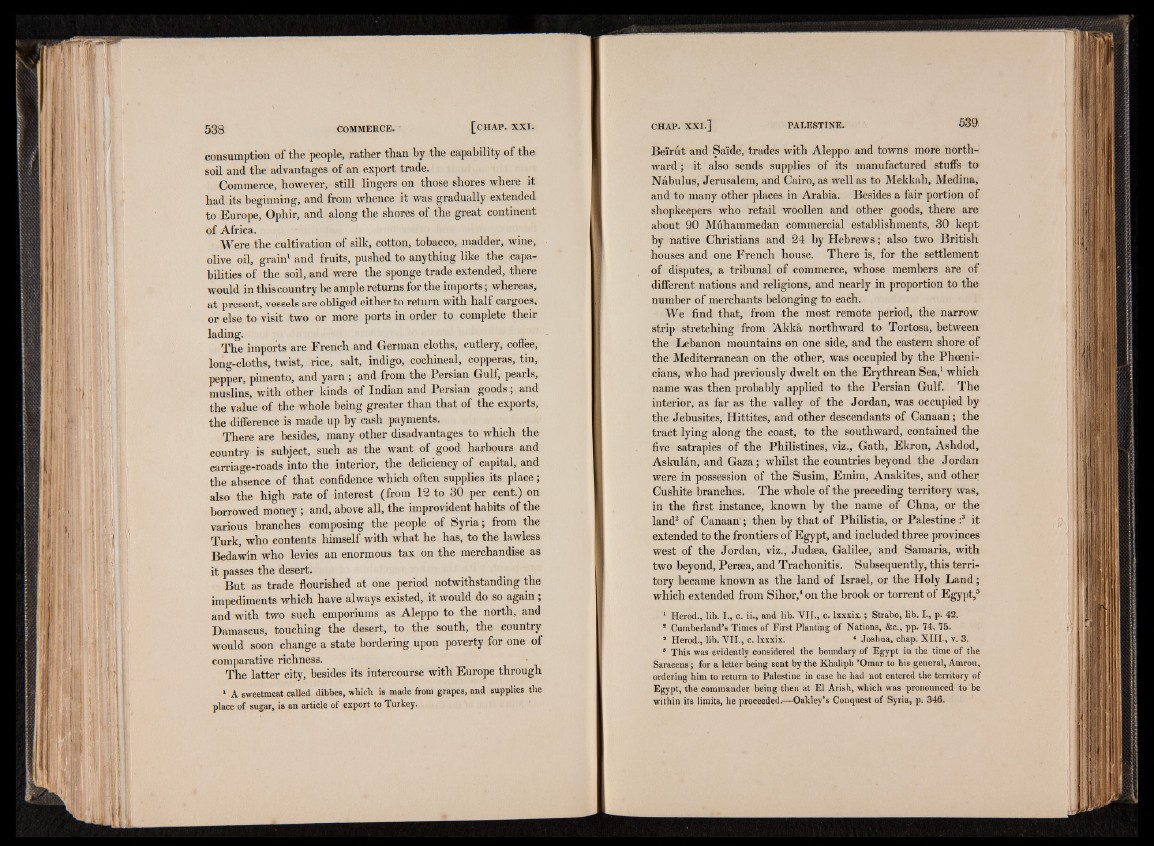
consumption of the people, rather than by the capability of the
soil and the advantages of an export trade.
Commerce, however, still lingers on those shores where it
had its beginning, and from whence it was gradually extended
to Europe, Ophir, and along the shores of the great continent
of Africa.
Were the cultivation of silk, cotton, tobacco, madder, wine,
olive oil, grain1 and fruits, pushed to anything like the capabilities
of the soil, and were the sponge trade extended, there
would in this country be ample returns for the imports; whereas,
at present, vessels are obliged either to return with half cargoes,
or else to visit two or more ports in order to complete their
lading.
The imports are French and German cloths, cutlery, coffee,
long-cloths, twist, rice, salt, indigo, cochineal, copperas, tin,
pepper, pimento, and yarn ; and from the Persian Gulf, pearls,
muslins, with other kinds of Indian and Persian goods; and
the value of the whole being greater than that of the exports,
the difference is made up by cash payments.
There are besides, many other disadvantages to which the
country is subject, such as the want of good harbours and
carriage-roads into the interior, the deficiency of capital, and
the absence of that confidence which often supplies its place;
also the high rate of interest (from 12 to 30 per cent.) on
borrowed money ; and, above all, the improvident habits of the
various branches composing the people of Syria; from the
Turk, who contents himself with what he has, to the lawless
Iledawin who levies an enormous tax on the merchandise as
it passes the desert.
But as trade flourished at one period notwithstanding the
impediments which have always existed, it would do so again ;
and with two such emporiums as Aleppo to the north, and
Damascus, touching the desert, to the south, the country
would soon change a state bordering upon poverty for one of
comparative richness.
The latter city, besides its intercourse with Europe through
1 A sweetmeat called dibbes, which is made from grapes, and supplies the
place of sugar, is an article of export to Turkey.
Beirut and Saide, trades with Aleppo and towns more northward
; it also sends supplies of its manufactured stuffs to
Nâbulus, Jerusalem, and Cairo, as well as to Mekkah, Medina,
and to many other places in Arabia. Besides a fair portion of
shopkeepers who retail woollen and other goods, there are
about 90 Muhammedan commercial establishments, 30 kept
by native Christians and 24 by Hebrews ; also two British
houses and one French house. There is, for the settlement
of disputes, a tribunal of commerce, whose members are of
different nations and religions, and nearly in proportion to the
number of merchants belonging to each.
We find that, from the most remote period, the narrow
strip stretching from Akkâ northward to Tortosa, between
the Lebanon mountains on one side, and the eastern shore of
the Mediterranean on the other, was occupied by the Phoenicians,
who had previously dwelt on the Erythrean Sea,1 which
name was then probably applied to the Persian Gulf. The
interior, as far as the valley of the Jordan, was occupied by
the Jebusites, Hittites, and other descendants of Canaan ; the
tract lying along the coast, to the southward, contained the
five satrapies of the Philistines, viz., Gath, Ekron, Ashdod,
Askulân, and Gaza ; whilst the countries beyond the Jordan
were in possession of the Susim, Emim, Anakites, and other
Cushite branches. The whole of the preceding territory was,
in the first instance, known by the name of Chna, or the
land2 of Canaan'; then by that of Philistia, or Palestine :3 it
extended to the frontiers of Egypt, and included three provinces
west of the Jordan, viz., Judæa, Galilee, and Samaria, with
two beyond, Peræa, and Trachonitis. Subsequently, this territory
became known as the land of Israel, or the Holy Land ;
which extended from Sihor,4 on the brook or torrent of Egypt,5
1 Herod., lib. I., c. ii., and lib. VII., c. lxxxix. ; Strabo, lib. I., p. 42.
! Cumberland’s Times of First Planting of Nations, &c., pp. 74, 75.
’ Herod., lib. VII., c. lxxxix. * Joshua, chap. XIII., v. 3.
* This was evidently considered the boundary of Egypt in the time of the
Saracens; for a letter being sent by the Khaliph ’Omar to his general, Amrou,
ordering him to return to Palestine in case he had not entered the territory of
Egypt, the commander being then at El Arish, which was pronounced to be
within its limits, he proceeded.—Oakley’s Conquest of Syria, p. 346.